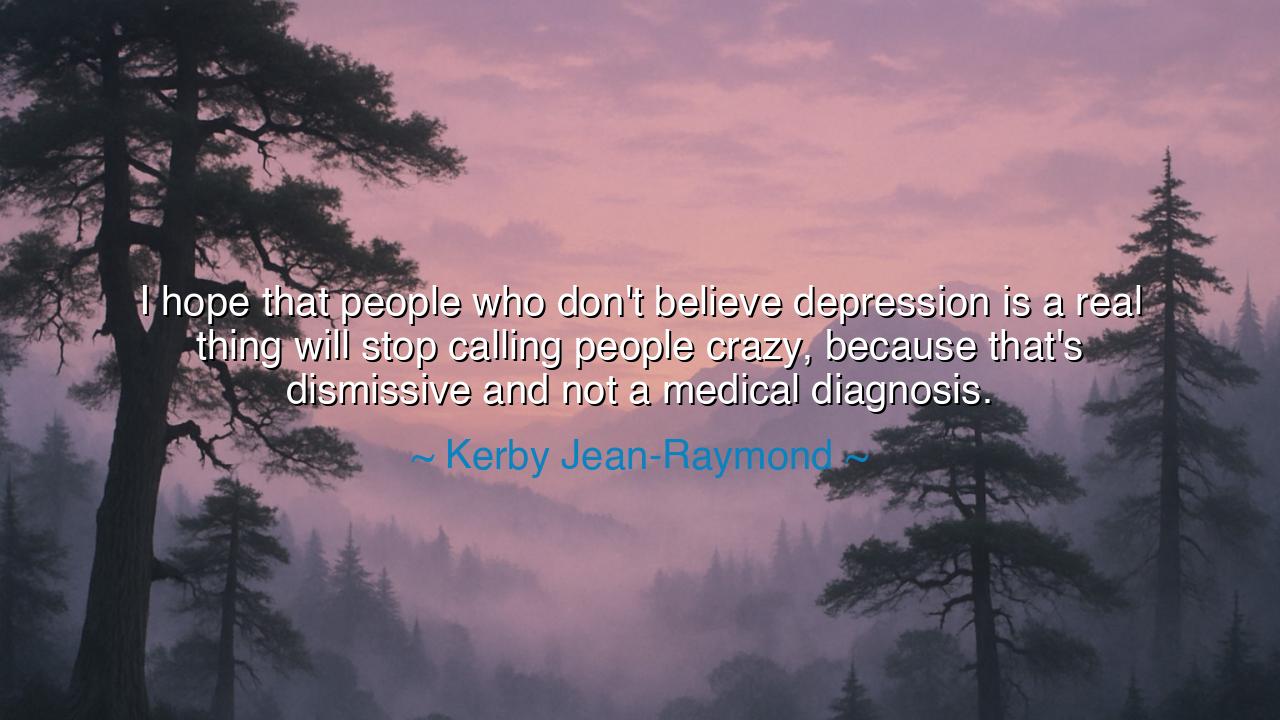
I hope that people who don't believe depression is a real thing
I hope that people who don't believe depression is a real thing will stop calling people crazy, because that's dismissive and not a medical diagnosis.






Hear, O children of the future, the words of Kerby Jean-Raymond, spoken with courage and compassion: “I hope that people who don't believe depression is a real thing will stop calling people crazy, because that's dismissive and not a medical diagnosis.” In this utterance lies a plea, a rebuke, and a vision of healing. He names depression as real, not as a phantom of weakness or a mark of shame, but as an affliction of the mind and spirit that deserves understanding. He warns against the careless word crazy, for such a word wounds deeper than the illness itself, stripping dignity from those already burdened.
From the dawn of ages, men and women have struggled with unseen suffering. In ancient Babylon, melancholy was attributed to spirits; in Greece, Hippocrates called it melancholia, a darkness of the soul brought by imbalance of the humors. Yet across centuries, those who suffered were often mocked, feared, or cast out. The name “mad” or “possessed” was hurled upon them, denying the truth of their pain. Jean-Raymond’s call is thus not new, but the continuation of a long struggle: the battle to replace stigma with compassion, scorn with science, cruelty with care.
Consider the story of Abraham Lincoln, revered as one of history’s great leaders. Beneath his stoic gaze lay profound depression, what he himself called “the gloom.” He wept often, spoke of death, and carried an unbearable weight of sorrow. Yet he led a nation through its darkest war, proving that those who suffer inwardly are not “crazy” but deeply human, often possessing profound empathy and vision. If Lincoln had been dismissed with scorn instead of seen with understanding, the world might never have witnessed the leadership that saved a nation.
Jean-Raymond’s words strike like a hammer upon stone, shattering the false walls of ignorance. To call a person crazy is to close the ear and harden the heart. It is to deny them both help and humanity. But to name their struggle rightly—as depression, as illness, as something treatable—is to open the way for healing. Just as a fever is not a failing of character, so too depression is not a moral weakness. It is a burden of the mind that must be lifted with care, patience, and love.
The meaning of this quote stretches beyond medical terms into the realm of justice. For words shape the way societies treat the afflicted. Where harsh labels prevail, neglect and cruelty follow. Where compassionate truth is spoken, pathways of healing open. Every careless insult is a wound; every word of understanding is a balm. The ancients taught that the tongue holds the power of life and death, and Jean-Raymond reminds us that this power remains.
The lesson, then, is this: guard your speech, for words can either chain or free. Speak not with dismissal, but with acknowledgment. If you know someone walking in the shadow of depression, do not brand them with cruelty, but extend your hand. Ask not, “What is wrong with you?” but, “How can I walk with you through this night?” And if you yourself suffer, remember: you are not “crazy.” You are human, deserving of dignity and healing.
Practical action must follow this wisdom. Learn the signs of mental illness, and treat them with the same seriousness as broken bones or fever. Challenge stigma when you hear it, whether in jest or in cruelty. Support those who seek help, and remind them that their struggle is neither shameful nor solitary. Above all, replace the weapon of the word crazy with the shield of empathy.
Thus Jean-Raymond’s hope becomes our duty: that future generations will no longer dismiss the wounded of spirit, but see them as brothers and sisters in need of care. Let us vow that we shall not perpetuate ignorance with our tongues, but speak life into those burdened by inner storms. For to heal the wounded body is noble, but to heal the wounded soul is divine. And so may his words endure, like a flame passed through the ages, guiding us to a world where compassion triumphs over scorn.






AAdministratorAdministrator
Welcome, honored guests. Please leave a comment, we will respond soon